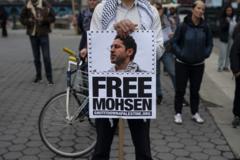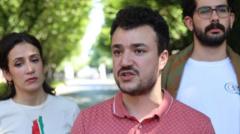Yehuda Bauer, an influential Holocaust scholar renowned for his deep insights into Jewish resistance during the Nazi era, has died at the age of 98 at his home in Jerusalem. His daughter, Anat Tsach, confirmed his passing, which follows a long life marked by significant contributions to Holocaust studies.
Yehuda Bauer: A Scholar’s Legacy on Holocaust Resistance

Yehuda Bauer: A Scholar’s Legacy on Holocaust Resistance
Renowned for illuminating Jewish resistance during the Holocaust, Yehuda Bauer passed away at 98, reshaping our understanding of history.
Born into a Jewish family in Czechoslovakia that narrowly escaped the Nazis in 1939, Dr. Bauer initially focused on the more recent history of Israel. However, a pivotal conversation with Abba Kovner in 1964 shifted his academic direction towards the Holocaust. In a time when many scholars hesitated to address this topic, fearing political repercussions concerning West Germany, Dr. Bauer became a key figure in highlighting Jewish defiance against the Nazis.
In 1961, Raul Hilberg published "The Destruction of the European Jews," detailing the German orchestration of the Holocaust. While groundbreaking, Dr. Bauer critiqued Hilberg for emphasizing the German side of the narrative at the expense of the Jewish experience. He believed it perpetuated a narrative of Jews solely as victims. In reaction, Bauer became a pioneer in studying the Jewish responses to oppression, asserting that many, like Kovner, actively fought back against their oppression.
Menachem Rosensaft, a genocide studies professor, remarked on Dr. Bauer's role in dismantling victim-centric myths surrounding the Holocaust. Through his efforts, Bauer ensured that historical discourse was enriched by understanding the complexities and resistances of those who lived through the Holocaust, thereby preserving the memory of those who fought against their oppressors. His legacy will resonate in Holocaust studies and inspire future scholarship.
Dr. Bauer's work has left an indelible mark on how we understand the Holocaust, illustrating that the narratives of resistance are as vital as the accounts of suffering.
In 1961, Raul Hilberg published "The Destruction of the European Jews," detailing the German orchestration of the Holocaust. While groundbreaking, Dr. Bauer critiqued Hilberg for emphasizing the German side of the narrative at the expense of the Jewish experience. He believed it perpetuated a narrative of Jews solely as victims. In reaction, Bauer became a pioneer in studying the Jewish responses to oppression, asserting that many, like Kovner, actively fought back against their oppression.
Menachem Rosensaft, a genocide studies professor, remarked on Dr. Bauer's role in dismantling victim-centric myths surrounding the Holocaust. Through his efforts, Bauer ensured that historical discourse was enriched by understanding the complexities and resistances of those who lived through the Holocaust, thereby preserving the memory of those who fought against their oppressors. His legacy will resonate in Holocaust studies and inspire future scholarship.
Dr. Bauer's work has left an indelible mark on how we understand the Holocaust, illustrating that the narratives of resistance are as vital as the accounts of suffering.






















